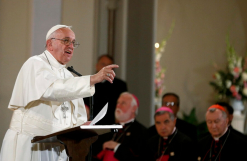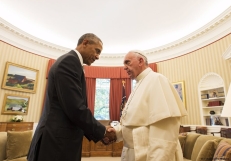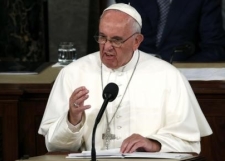
In his historic address to Congress yesterday Pope Francis mentioned two American Catholics who it's fair to say aren't household words – Dorothy Day and Thomas Merton. So who was Dorothy Day and why did the Pope think she was important enough to mention?
Dorothy Day (1897-1980) was a thinker and activist who established the Catholic Worker Movement and founded the Catholic Worker newspaper. After attending the University of Illinois for two years she went to New York, where she became involved in left-wing causes. She was arrested and served a short jail sentence in 1917 for taking part in a campaign for women's suffrage.
She lived a bohemian life, taking lovers and having an abortion. She found herself pregnant again and gave birth to a daughter, Tamar Teresa, in 1926. She became increasingly drawn to Catholicism, which led to the breakdown of her relationship with Tamar's father Forster Batterham.
She supported herself as a journalist for several years before meeting Peter Maurin, who had a vision of social justice inspired by Francis of Assisi – the figure who has inspired the present Pope Francis.

The Catholic Worker Movement started in 1933 and was aimed at helping those suffering in the Great Depression. Originally backed by the Church, the movement – and Day herself – came into frequent conflict with the authorities in later years and lost support through its uncompromisingly pacifist stance. She crossed swords particularly with Cardinal Francis Spellman of New York over his attitude to workers' rights and his support for the Vietnam War, which he said was "a war for civilization". Her belief in the mission of the Church to the poor and her willingness to challenge unjust structures and laws rather than simply offering charity has increasingly resonated with Catholic and wider Christian social teaching.
Day sympathised with unpopular causes and individuals all her life, including Fidel Castro. But she was opposed to liberal causes like sexual freedom, saying that when sex is "treated lightly, as a means of pleasure... it takes on the quality of the demonic, and to descend into this blackness is to have a foretaste of hell".
She became increasingly respected during her later years. In 2000 a cause for her canonisation was opened.
Here are 10 quotes from Dorothy Day.
1. The greatest challenge of the day is: how to bring about a revolution of the heart, a revolution which has to start with each one of us?
2. We have all known the long loneliness and we have learned that the only solution is love and that love comes with community.
3. Don't worry about being effective. Just concentrate on being faithful to the truth.
4. What we would like to do is change the world--make it a little simpler for people to feed, clothe, and shelter themselves as God intended them to do. And, by fighting for better conditions, by crying out unceasingly for the rights of the workers, the poor, of the destitute--the rights of the worthy and the unworthy poor, in other words--we can, to a certain extent, change the world; we can work for the oasis, the little cell of joy and peace in a harried world.
5. The Gospel takes away our right forever, to discriminate between the deserving and the undeserving poor.
6. It is people who are important, not the masses.
7. God meant for things to be much easier than we have made them.
8. I felt that the Church was the Church of the poor,... but at the same time, I felt that it did not set its face against a social order which made so much charity in the present sense of the word necessary. I felt that charity was a word to choke over. Who wanted charity? And it was not just human pride but a strong sense of man's dignity and worth, and what was due to him in justice, that made me resent, rather than feel pround of so mighty a sum total of Catholic institutions.
9. There are two things you should know about the poor: they tend to smell, and they are ungrateful.
10. If I have achieved anything in my life, it is because I have not been embarrassed to talk about God.

















